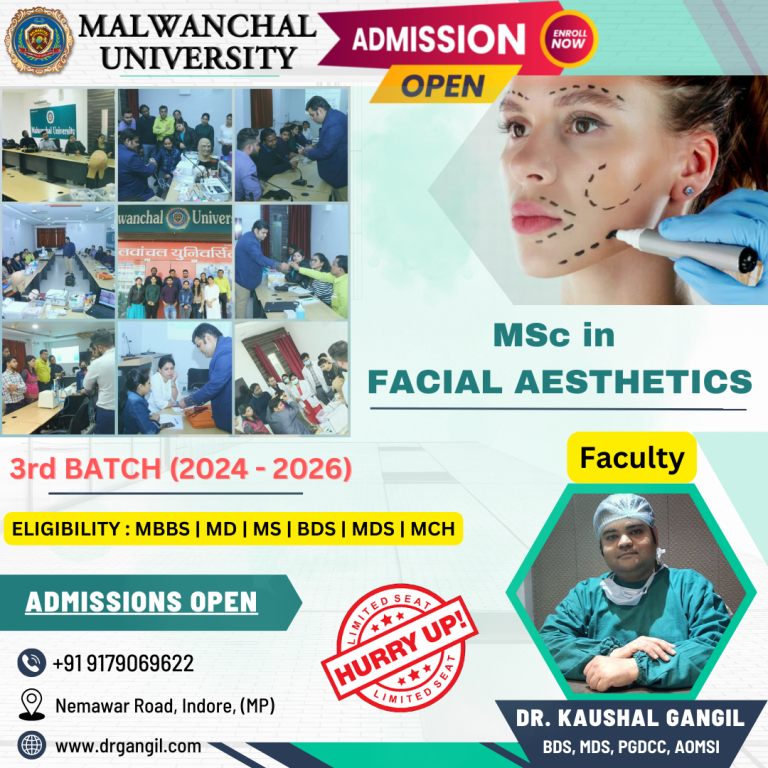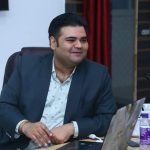Department of Cosmetology


MALWANCHAL UNIVERSITY
MALWANCHAL UNIVERSITY ESTABLISHMENT UNDER MP ACT NO 17 OF 2007
(U.G.C. APPROVED UNIVERSITY)
MSc in Facial Aesthetics
MSc in Facial Aesthetics
Msc. in Facial Aesthetics is a 2 yrs Post Graduation Degree Programme, in which doctors will learn the intricate art & Science of the most advanced & latest Laser & Cosmetic surgery and procedures overview of Hair Transplant, Hair Implants, Anti-aging, Anti- Acne, PRP therapies, Botox, Fillers and Threads, and many more world class Cosmetic techniques 1st time in Madhya Pradesh.
ELIGIBILITY : MBBS | MD| MS | BDS | MDS | MCH
AIMS
The goal of this program is to produce competent Facial Aesthetics and / or teachers who shall be,
1. Graduate medical student who is oriented toward straining students to undertake the responsibilities of a trained doctor who is Knowledgeable in various AESTHETIC techniques.
2. With wide range of career opportunities available today, a graduate has a wide choice of career opportunities. The training, though broad based and flexible shall aim to provide an educational experience of the essentials required for health care in our country. Training is designed to meet internationally acceptable standards.
3. To undertake the responsibilities of service situations which is a changing condition and of various types, Able to diagnose the situation and provide proper treatment.
4. The educational experience shall emphasize health and community orientation instead of only disease and hospital orientation or being-concentrated – on-curative -aspects. In position to repair & restore the lost structure to maintain harmony between both the hard and soft tissues of the oral cavity and facial structures.
5. There must be enough experiences to be provided for self learning. The methods and techniques that would ensure this must become a part of teaching-learning process.
6. Lectures alone are generally not adequate as a method of training and are a poor means of transferring/acquiring information and even less effective at skill development and in generating the appropriate attitudes. Every effort shall be made to encourage the use of active methods related to demonstration and on firsthand experience. While the curriculum objectives often refer to areas of knowledge or science, they are best taught in a setting of clinical relevance and hands on experience for Proper records of the work shall be maintained and students who assimilate and make this knowledge a part of their own working skills.
7. The methods and techniques that would ensure and Able to manage complications which may arise after Treatment
8. Every attempt shall be made to encourage students to participate in group discussions and seminars to enable them to develop personality, character, expression and other faculties which are necessary for a medical graduate to function either in solo practice or as a team leader when he/she begins his independent career and have Skillful to execute the treatment and Knowledgeable in the available materials.
9. Faculty member shall avail modern educational technology while teaching the students and to attain this objective to Able to asses the predictable long term results.
10. Institution shall insure that adequate financial and technical inputs are provided.
11. The Institution shall have a curriculum committee which would plan curricula and instructional method which will be regularly updated.
12. Integration of ICT in learning process will be implemented.
OBJECTIVES
- The end of postgraduate program, the medical M.Sc. student should be able to:
- Recognize ‘health for all’ as a national goal and health right of all citizens and by undergoing. training & fulfill his/her social obligations towards realization of this goal.
- Learn every aspect of National policies on health and devote himself/herself to its practical implementation.
- Achieve competence in practice of holistic medicine,
encompassing promotive preventive, curative and rehabilitative aspects of common diseases. - Develop scientific temper, acquire educational experience for proficiency in profession and promote healthy living.
- Become exemplary citizen by observation of medical ethics and fulfilling social and professional obligations, so as to respond to national aspirations.
- Be competent in diagnosis and management of common health problems of the individual and the community, commensurate with his/her position as a member of the health team, using his/her clinical & diagnostic skills based on history and relevant investigations.
- Be competent to practice preventive, promotive, curative and rehabilitative medicine in respect to the commonly encountered health problems.
- Be able to appreciate the socio-psychological, cultural, economic and environmental factors affecting health and develop humane attitude towards the patients in discharging one’s professional responsibilities.
- Possess the attitude for continued self learning and to seek further expertise or to pursue research in any chosen area of medicine.
- Possess the attitude for continued self learning and to seek further expertise or to pursue research in any chosen area of facial aesthetic.
- Acquire basic management skills in the area of human resources, materials and resource management related to health care delivery, General and hospital management, principal inventory skills and counseling.
- Be able to identify community health problems and learn to work to resolve these by designing, instituting corrective steps and-evaluating outcome of such measur.
- Be able to work as a leading partner in health care teams and replace lost natural structures.
- Be able to make use of conventional techniques/instruments to perform analysis relevant to clinical screening and diagnosis.
- Be competent to analyze and interpret investigative data.
- Be able to demonstrate the skill of solving scientific and clinical problems and decision making.
- Be competent to work in a variety of health care settings.
- Have personal characteristics and attitudes required for professional life such as personal integrity, sense of responsibility and dependability and ability to relate to restore functional ability, esthetics and develop effective human approach skills and enhance their diagnostic, surgical and restorative skills to disseminate the acquired scientific knowledge of all procedures.
- All efforts shall be made to equip the postgraduate in facial aesthetic to maintain patients health, educate the patient about the importance of esthetics and acquire knowledge from historical perspective to advancement in the subject proper and related topics.
COURSE STRUCTURE
1.Training Period and Time Distribution.
The whole course programmed will contain 12 modules which will be completed within 2 year period.
- The initial module is a foundation based, where the students will be familiarized with the basic subjects. There will be dedicated lectures, regular practical and demonstration classes.
- After basic module, other modules are devoted to minimal invasive facial aesthetic. Apart from regular lecture and practical classes, there will be group discussions, seminars, journal clubs etc. There will be hands-on training too.
Each student will be given a research thesis topic to provide experience in research methodology.
2. Module wise syllabus Details :
A. Module 1/2: Basic Sciences, Skin Anatomy, Blood Derivatives & Research Methodologies.
Head and Neck Anatomy
- Maxilla / Mandible: Osteology ,muscle attachments, blood supply & nerve supply / age changes
- Physiology of Aging
- Skin Anatomy – Understand skin in terms of Embryology , structure & function
- To understand affect of aging / habits upon the skin , layers of epidermis , layers of dermis , functions of dermis cells /non cellular elements
- Different types of Fitzpatrick skin types the effect of UV lights on the skin, sun tanning sun damage on the skin , skin ablative treatments , skin non ablative treatments, Lasers , IPL.RF treatments
- Mucosa , Epithelium – Significance
- Temporomandibular joints
- Scalp Anatomy – Blood supply , Nerve supply , layers
- Intraoral structure
- Anesthesia – Face blocks, local infiltration , Intra oral / extra oral / closed mouth
- Collagen induction basic
- Role of Collagen / production of Collagen
- Cellular response, cells responsible for collagen production
- Procedures for collagen production
- Meso-therapy, Microdermabrasion, Micro needling
Collagen threads - History /Types of threads
- Use of threads
- Surgical vs Non surgical procedures
- Systemic disease & Diagnosis
- Radiographic interpretation – MRI , CT-Scan , Radiograph
- Neoplasm and types of neoplasm
- Investigations
Post operative facial scar & Keloid
B. MODULE 3/4 – Injectables / Applicable Solutions
- Anatomy of facial pads & Physiological effects of ageing
- Replacement options by natural and artificial
- Dermal fillers
- Introduction, types of fillers ,
- Hyaluronic Acids(HA), different types based upon use and linkage
- Indication/ contraindication of H.A
- Injection procedures ,different manufactures , treatment of complication
- Managing patient expectations
- Non HA fillers – Permanent/ temporary synthetic, Autologous
- Dermal fillers for specific region – lips hands face neck jaw body
- Augmentation of facial fat pads with dermal fillers , aesthetic treatments
- Intraoral uses of dermal fillers, Interpapillary loss , gingival recession , Graft material
- Tissue engineering
C. MODULE 5/6: Hair Restoration & Removal
Normal Hair growth Cycles, Hair color & variations Hair follicle anatomy ,Physiology & pathology and how this related to hair follicle pharmacological treatment pathological /physiological hair fall Systemic conditions related with Hair Growth & hair fall Syndrome associated with hair problems,
- Concept of Hair aesthetics – Hair transplant systems , Biofibers and Artificial system Drug treatment , use , dose , working Non –surgical vs surgical vs Lasers system
- Lasers – types of lasers for Hair removal ,Operating system Complications
- Introduction
- Types of Laser / Classification
- Application of Lasers
- Ablating / Non Ablating Lasers
- Hard tissue / Soft tissue Lasers
- Reduction of wrinkles, age spots, Melasma , post wrinkle birthmarks, spider veins, Rosacea, Unwanted hair, Removing warts & growths, Diminish scars, Removing Tattoos
- Selections of patients, preparations of patients
- Post treatment / care
- Post surgical scar correction Scar revision
- Complications
- Potential risks
- Follow up
- Aesthetic / Regenerative Medicine / Dental
- Introduction
- Concept of Stem cells
- Types of stem cells
- Pre-Examination
- Procedures for Stem cell collections
- Differentiations , amplifications , applications
- Lab processing ,Isolation analysis & concentrations of stem cells in the Lab
- Stem cell implantation
- Anti-aging & Skin Rejuvenation by stem cells
- Bio-fillers for wrinkle fillers
- Body contouring
- Cosmetic gynaecology , Scar & Stretch marks
- Hair loss
- Total body rejuvenation
- Bio –identical hormones
- Nutrition & supplements
- Lifestyle & auto-immune diseases
- Sports injury
- Dental stem cells
- Regenerative Endo / Period
- Plasma technologies in Aesthetic Medicine
- Radio frequency devices and procedure
- R.F Mono / Bi-Tripolar ( Exillis ,reaction ,pollogen , Fraxel etc)
- Ultra Sound based devices , Cryolipolysis
- Cryolipolysis – body, face, jaw
- Acoustic wave therapy ( X-Wave)
- Cellulite reduction device
- Skin lighting treatment
- Mode of actions
- Newest technologies & innovations in Aesthetic medicine
FEE STRUCTURE
Total Duration of Course : 2 Years
Total Tuition Fees : 3.25 Lakhs
Total Number of Modules : 12
(3 Days in every Two Months for 2 Years)
FACULTY

Dr Kaushal Gangil
BDS, MDS, PGDCC
Oral & Maxillofacial surgeon
Hair Transplant surgeon
For Admission Related Queries
Contact Person:
Dr Kaushal Gangil
E-mail: care@drgangil.com
P. No: +91 9179069622, +91 8962165336